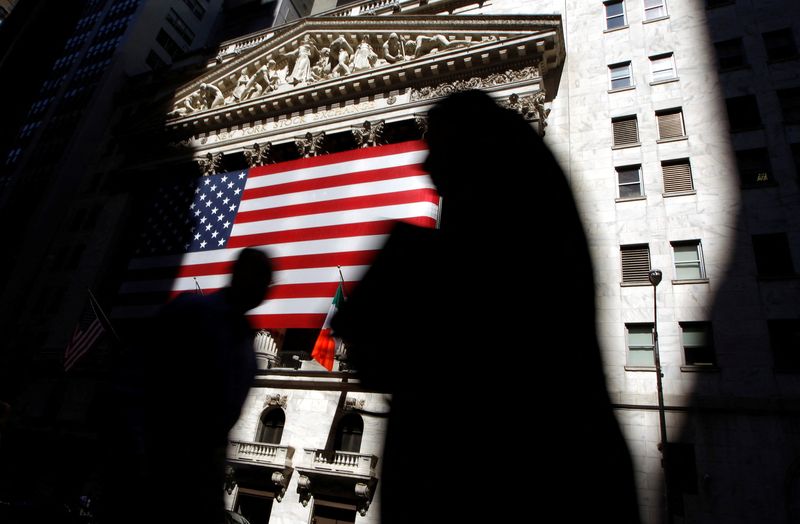Investing.com -- U.S. stock futures inched higher, with investors closely monitoring policy commentary from Federal Reserve officials and ongoing developments in the conflict in the Middle East. Traders hunt for safety in U.S. Treasuries as bond markets return from the Columbus Day holiday, while Country Garden shares slump after the cash-strapped Chinese developer misses an international debt payment.
1. Futures point higher as investors gauge Fed speak, Middle East conflict
U.S. stock futures moved higher on Tuesday, but stayed relatively close to the flatline, as traders digested comments from Federal Reserve speakers on interest rates and kept an eye on violence in the Middle East.
At 04:53 ET (08:53 GMT), the Dow futures contract added 61 points or 0.2%, S&P 500 futures gained 7 points or 0.2%, and the Nasdaq 100 futures rose by 31 points or 0.2%.
The major indices ended the prior session in the green, reversing earlier declines. Wall Street was buoyed in part by dovish statements from Fed officials, who suggested that a recent drive higher in U.S. Treasury yields could lessen the need for the central bank to hike borrowing costs in the short term.
Energy stocks were among the best performers, boosted by a jump in oil prices on Monday linked to worries over the geopolitical ramifications of the escalation of hostilities between Israel and Palestinian Islamist group Hamas.
Shares in major airlines dipped following the surge in oil prices and the decision by many carriers to cancel flights to Tel Aviv, Israel's main travel gateway. Meanwhile, defense stocks rallied on news of the conflict, with the S&P 500 Aerospace & Defense index posting its biggest one-day percentage bump since 2020.
2. U.S. Treasury yields slip in Asia amid push for safe havens
U.S. Treasury yields were mostly lower, with traders flocking for the relative safety of American debt following the intensifying turmoil in Gaza.
The yield on the benchmark 10-year Treasury note dropped to 4.62% at one point in Asian trading, marking its biggest decline since March. It also pared back slightly from a steep recent sell-off that was sparked by concerns that the Fed would choose to keep interest rates elevated for a longer period than initially anticipated.
However, by 04:54 ET, the 10-year yield had moved higher by 0.007 percentage points to 4.65%. In other durations, the rate-sensitive 2-year shed 0.09 percentage points to 4.98% and the longer-maturity 30-year yield fell by 0.10 percentage points to 4.84%. Yields typically move inversely to prices.
U.S. bond markets had been closed on Monday for the Columbus Day holiday, making this morning the first time that investors were able to place capital into government debt since last weekend's surprise attack by Hamas on Israeli areas near Gaza.
3. Fed officials comment on recent yield spike
Yields were also driven lower by commentary from two top-ranking Federal Reserve officials, which helped to soothe some market jitters that the U.S. central bank would further tighten monetary policy.
Since the Fed's last meeting in September, yields on 10-year Treasuries have risen sharply, leaving policymakers the task of assessing whether this is a result of expectations for a stronger economy or investors asking for better returns to carry interest-rate risk.
Speaking at a conference, Dallas Fed President Lorie Logan posited that the higher yields may offset a need to raise the key Fed funds rate. At the same event, Fed Vice Chair Philip Jefferson also flagged that the central bank must now "proceed carefully" in the wake of the jump in long-term yields.
Markets will be keen to see if these sentiments will be echoed by several other Fed officials scheduled to speak this week. Minutes from the central bank's September gathering are also due out on Wednesday, while all-important consumer price figures are set to be published on Thursday.
4. Crude hover around flatline with Middle East turmoil in focus
Oil prices oscillated around the flatline on Tuesday, with investors attempting to gauge the potential for supply disruptions caused by the conflict between Israel and Hamas.
By 04:55 ET, the U.S. crude futures traded 0.2% higher at $86.56 a barrel, while the Brent contract increased by 0.2% to $88.30.
Both benchmarks surged more than 4% on Monday after Hamas launched the largest assault on Israel in decades over the weekend, prompting severe retaliation from Israel with a wave of air strikes on Gaza.
Traders fretted that the violence could expand deeper into the Middle East, possibly threatening an already tight supply picture in the region.
5. Country Garden fails to make loan payment
Shares in Country Garden (HK:2007) shed more than 10% of their value on Tuesday after the embattled Chinese property developer failed to make a repayment on an international loan that had come due.
In a regulatory filing with the Hong Kong Stock Exchange, the Foshan-based company also flagged that it does not expect to meet all of its U.S. dollar-denominated and other offshore payment obligations "when due or within the relevant grace periods," sparking fears of a possible default.
Country Garden added that sales have been under "remarkable pressure" since the beginning of the year. In September, the group's contracted sales decreased for the sixth straight month to RMB 6.17 billion -- a drop of 80.7% compared to the same month in 2022.
The firm, which previously managed to avoid a technical default last month, noted that it had brought on financial advisers to help develop the "most pragmatic and optimal solution" for its creditors.
